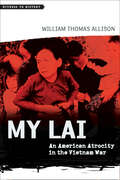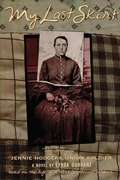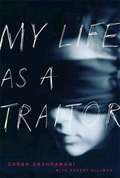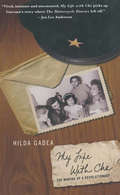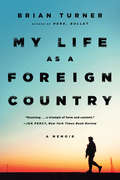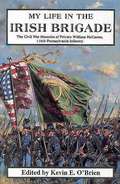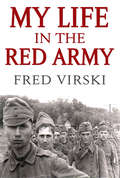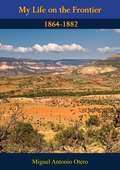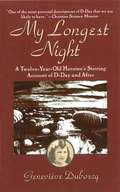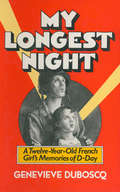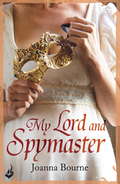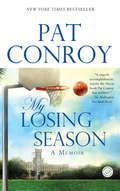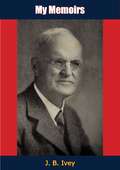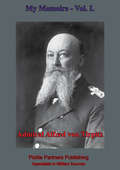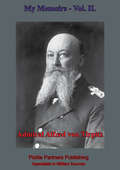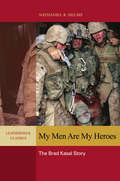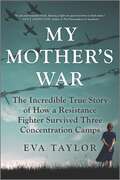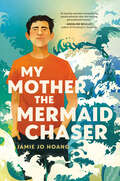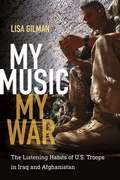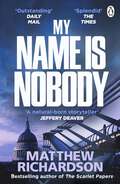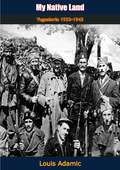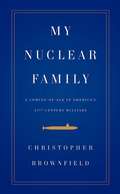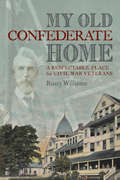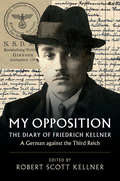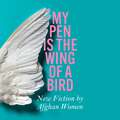- Table View
- List View
My Lai: An American Atrocity in the Vietnam War (Witness to History)
by William Thomas AllisonAllison tells the story of a terrible moment in American history and explores how to deal with the aftermath.On March 16, 1968, American soldiers killed as many as five hundred Vietnamese men, women, and children in a village near the South China Sea. In My Lai William Thomas Allison explores and evaluates the significance of this horrific event. How could such a thing have happened? Who (or what) should be held accountable? How do we remember this atrocity and try to apply its lessons, if any? My Lai has fixed the attention of Americans of various political stripes for more than forty years. The breadth of writing on the massacre, from news reports to scholarly accounts, highlights the difficulty of establishing fact and motive in an incident during which confusion, prejudice, and self-preservation overwhelmed the troops. Son of a Marine veteran of the Vietnam War—and aware that the generation who lived through the incident is aging—Allison seeks to ensure that our collective memory of this shameful episode does not fade.Well written and accessible, Allison’s book provides a clear narrative of this historic moment and offers suggestions for how to come to terms with its aftermath.
My Last Skirt
by Lynda DurrantJennie Hodgers dressed as a boy for the first time in order to help support her impoverished Irish family with a shepherd's wages. Then her arrival in America confirmed her belief that the world offers better opportunities to young men than to young women. So Jennie maintained her outward identity as Albert Cashier, serving as a grocery clerk in Queens, New York; as a farmhand in Ohio; and as a recruit in the 95th Illinois Infantry during the Civil War. Not only did she survive three years in combat with her true identity undiscovered, she chose to continue living as Albert for nearly all of her life.Combining careful research with vivid insight, Lynda Durrant portrays Albert Cashier as a soldier who served his adopted country and his comrades with loyalty and heroism, and Jennie Hodgers as a woman of a woman of astonishing strength, courage, and adaptability-a woman sometimes at war with her own secrets. Author's note, bibliography.
My Life As a Traitor: A Story of Courage and Survival in Tehran's Brutal Evin Prison
by Zarah Ghahramani Robert HillmanAt the age of twenty, an Iranian student named Zarah Ghahramani was swept off the streets of Tehran and taken to the notorious Evin prison, where criminals and political dissidents were held side by side in conditions of legendary brutality. Her crime, she asserts, was in wanting to slide back her headscarf to feel the sun on a few inches of her hair. That modest desire led her to a political activism fueled by the fearless idealism of the young. Her parents begged her to be prudent, but even they could not have imagined the horrors she faced in prison. She underwent psychological and physical torture, hanging on to sanity by scratching messages to fellow prisoners on the latrine door. She fought despair by recalling her idyllic childhood in a sprawling and affectionate family that prized tolerance and freedom of thought. After a show trial, Ghahramani was driven deep into the desert outside Tehran, uncertain if she was to be executed or freed. There she was abandoned to begin the long walk back to reclaim herself. In prose of astonishing dignity and force, Ghahramani recounts the ways in which power seduces and deforms. A richly textured memoir that celebrates a triumph of the individual over the state, My Life as a Traitor is an affecting addition to the literature of struggle and dissent.
My Life With Che: The Making of a Revolutionary
by Hilda GadeaHe stayed to talk that day for some time. Eventually Lucila left the room. Then we turned to more personal matters, the disagreement completely forgotten. I confessed that I had been deeply moved by what he had written in the book' Che Guevara's first wife, Hilda Gadea, was with him during a tumultuous period in his life, the period which turned him from an intellectual theorist to a dedicated revolutionist. After 5 years of marriage and the birth of their daughter, Hildita, Hilda Gadea paints an intimate and extraordinary portrait of this legendary figure; one who is a romantic wanderer, a philosopher and doting suitor and father. Ernesto Guevara and Hilda Gadea met in Guatemala as members of the political-exile community. Later they were forced to flee Mexico, where their friendship grew stronger and where, stimulated by the intelligence and knowledge of Hilda, Che's vista's broadened and his convictions hardened. Hilda's account of their life together in Mexico is filled with joy but at times is terribly strained. They found it difficult to make a living and Che suffered from severe asthmatic attacks. Nevertheless the excitement of involvement with the Castros and other Cuban refugees infuses every page. Gradually the character of this great leader is revealed by the woman who knew him best, providing a vital key to acomprehension of Che's legendary qualities.
My Life as a Foreign Country: A Memoir
by Brian TurnerA war memoir of unusual literary beauty and power from the acclaimed poet who wrote the poem "The Hurt Locker." In 2003, Sergeant Brian Turner crossed the line of departure with a convoy of soldiers headed into the Iraqi desert. Now he lies awake each night beside his sleeping wife, imagining himself as a drone aircraft, hovering over the terrains of Bosnia and Vietnam, Iraq and Northern Ireland, the killing fields of Cambodia and the death camps of Europe. In this breathtaking memoir, award-winning poet Brian Turner retraces his war experience--pre-deployment to combat zone, homecoming to aftermath. Free of self-indulgence or self-glorification, his account combines recollection with the imagination's efforts to make reality comprehensible. Across time, he seeks parallels in the histories of others who have gone to war, especially his taciturn grandfather (World War II), father (Cold War), and uncle (Vietnam). Turner also offers something that is truly rare in a memoir of violent conflict--he sees through the eyes of the enemy, imagining his way into the experience of the "other." Through it all, he paints a devastating portrait of what it means to be a soldier and a human being.
My Life in the Irish Brigade: The Civil War Memoirs of Private William Mccarter, 116th Pennsylvania Infantry
by Geoffrey O'Brien Kevin E. O'Brien William McCarterThe Civil War Memoirs of Private William McCarter, 116 Pennsylvania Infantry William McCarter, a 21-year-old Irish immigrant, was present at the storming of Marye's Heights at the battle of Fredericksburg and left behind observations of several prominent Union personalities as well as daily life in the Army of the Potomac.
My Life in the Red Army
by Fred VirskiMy Life in the Red Army is the true-life account of 19-year old Polish citizen Fred Virski, who was drafted into the Red Army of the Soviet Union in 1938. The book chronicles Virski’s experiences as a soldier in the Ukraine and Central Asia, describing the hardships, his comrades-in-arms, the food, clothing, and interactions with officers and the NKVD (secret police). When war with Germany breaks-out, Virski witnesses scenes of brutality and is caught in fierce fighting, where he is wounded and hospitalized. Following his recovery, he eventually makes his way back to his native Poland. My Life in the Red Army is impressive for its straightforward style tinged with a sense of humor, despite the author’s difficult, often dangerous situation.
My Life on the Frontier 1864-1882: Facsimile Of Original 1935 Edition
by Miguel Antonio OteroIn this fascinating biography, the former Governor of Mexico, Miguel Antonio Otero, vividly describes incidents and characters of the period when Kansas, Colorado, and New Mexico were passing through the last of their wild and romantic years.This captivating memoir covers the adventures of Otero’s youth through age 23, including several encounters with Western icons such as Kit Carson, Wild Bill Hickok, Gen. George Armstrong Custer, Doc Holliday, Bat Masterson, and Jesse James.
My Longest Night
by Genevieve Duboscq"So direct and unaffected that the mot juste is 'amateur' in the original sense of the one who embarks on a project motivated by love and conviction rather than for gain."-Los Angeles Times Fifty years have passed since the Normandy landing that began the liberation of France from Nazi occupation. This touching eyewitness account, told from the perspective of a twelve-year-old girl, has all the force and beauty of Anne Frank's Diary of a Young Girl. As the first wave of Allied paratroopers landed behind the lines in Normandy on the night of June 5, 1944, many fell into the flooded marshlands on either side of the railway line that ran between Paris and Cherbourg-virtually in the Duboscq family's backyard. Throughout that historic night, Geneviève and her father, a hard-drinking peasant named Papa Maurice, saved numerous Americans from drowning and gave them refuge while they regrouped for what was to become one of the most heroic battles of World War II.
My Longest Night: A Twelve-Year-Old French Girl's Memories of D-Day
by Genevieve Duboscq&“In a childlike style that reflects the excitement of those dramatic, danger-filled days,&” a young French girl portrays her heroism during World War II (Publishers Weekly). Such was the sleepy nature of the Normandy town of Sainte-Mère-Église and such was the hostile nature of the &“vast area of marshes and lowlands&” surrounding it, that it seemed immune from the terror and chaos of war. Indeed, it seemed hard to imagine the local people ever hearing more than the distant rumblings of war or suffering more than those minor discomforts and humiliations which plague a rural community largely left alone by an Army of Occupation. The evening of June 5th, 1944 seemed like any other, yet for Geneviève Duboscq, not yet twelve, and her five-year-old brother, that evening would become their longest night—one they would never forget. An American paratrooper appeared on the Duboscq&’s doorstep quickly followed by other battered emissaries of freedom. The Duboscq&’s house became an emergency shelter; their knowledge of the region the difference between life and death, success and failure to those liberators from the sky. My Longest Night, with exemplary simplicity and poignancy, depicts D-Day and what followed in a way that it has never been presented before. Geneviève Dubsocq emerges as a remarkable young woman whose story will touch the hearts and minds of all who read it.&“One of the most personal descriptions of D-Day that we are likely to have.&” —Christian Science Monitor
My Lord and Spymaster: Spymaster 3 (Spymaster)
by Joanna BourneJoanna Bourne returns to the French Revolution, pairing espionage and burning romance to create an unforgettable love story. For fans of Stephanie Laurens, Elizabeth Hoyt and Poldark, this is a must-read.A daring beauty, she's infamous for taking chances... Now she'll risk everything for love.Raised as a poor but cunning pickpocket, Jess Whitby has grown into a wealthy young woman. But when her father is wrongly accused of selling secrets to Napoleon, she must rely on her guile to save him. She never dreamed her search for the real traitor would begin by waking up naked in a captain's bed. Or how little she'd mind...Captain Sebastian Kennett finds himself infatuated with the courageous spirit of the kidnap victim he saves. She's equally enthralled by his commanding strength - until she discovers that this spellbinding seaman could be traitor she's hunting, and the man to determine her both her father's fate and her future too.For more spellbinding Spymasters romance, look for the other titles by Joanna Bourne: The Forbidden Rose, The Spymaster's Lady, The Black Hawk and Rogue Spy.
My Losing Season: A Memoir
by Pat ConroyPAT CONROY--AMERICA'S MOST BELOVED STORYTELLER--IS BACK! "I was born to be a point guard, but not a very good one. . . .There was a time in my life when I walked through the world known to myself and others as an athlete. It was part of my own definition of who I was and certainly the part I most respected. When I was a young man, I was well-built and agile and ready for the rough and tumble of games, and athletics provided the single outlet for a repressed and preternaturally shy boy to express himself in public....I lost myself in the beauty of sport and made my family proud while passing through the silent eye of the storm that was my childhood." So begins Pat Conroy's journey back to 1967 and his startling realization "that this season had been seminal and easily the most consequential of my life." The place is the Citadel in Charleston, South Carolina, that now famous military college, and in memory Conroy gathers around him his team to relive their few triumphs and humiliating defeats. In a narrative that moves seamlessly between the action of the season and flashbacks into his childhood, we see the author's love of basketball and how crucial the role of athlete is to all these young men who are struggling to find their own identity and their place in the world. In fast-paced exhilarating games, readers will laugh in delight and cry in disappointment. But as the story continues, we gradually see the self-professed "mediocre" athlete merge into the point guard whose spirit drives the team. He rallies them to play their best while closing off the shouts of "Don' t shoot, Conroy" that come from the coach on the sidelines. For Coach Mel Thompson is to Conroy the undermining presence that his father had been throughout his childhood. And in these pages finally, heartbreakingly, we learn the truth about the Great Santini. In My Losing Season Pat Conroy has written an American classic about young men and the bonds they form, about losing and the lessons it imparts, about finding one's voice and one's self in the midst of defeat. And in his trademark language, we see the young Conroy walk from his life as an athlete to the writer the world knows him to be. BONUS: This edition includes an excerpt from Pat Conroy's The Death of Santini.
My Memoirs
by J. B. IveyJ. B. Ivey (1864-1958) belonged to a distinguished list of storekeepers who came to Charlotte at the turn of the century to take advantage of the booming cotton mill economy. He opened a small store room in rented space near the Square on West Trade Street on February 18, 1900, and over the following decades, with Charlotte’s ever-increasing population, J. B. Ivey & Company grew into a big store and rapidly growing business. Ivey’s went on to dominate not only the retail business of uptown Charlotte, but also continued to expand all over North Carolina and down as far as Florida.This is the biography of North Carolina’s grandest department store magnate himself.
My Memoirs. Vol. I.
by Anon. Admiral Alfred von TirpitzWhen Prussia, with her German allies, went to war with the French Empire under Napoleon III, her navy sat with tons of barnacles on the hulls of her battleships. Her navy was small, ineffective, without doctrine and destitute of funding. As nascent Germany struggled to become a 'Great Power', the navy was to be thoroughly updated. The man who took on this challenge was Grand Admiral Alfred von Tirpitz, a seasoned sailor who was given huge power as the Secretary of State for the Imperial Navy Office to ring the changes and produce a force that would be a political weapon on the World Stage.Tirpitz and his officers set to work without any of the preconceptions that hamstrung their only obvious opponent, the Royal Navy, and advanced the idea of submarines and torpedoes as critical weapons of Naval importance. The fruits of his labours produced a potent navy which sought to antagonize the Royal Navy into conflict, and during the only major engagement of the First World War at Jutland, their superior gunnery caused much damage to the British Fleet. He was, however, hoisted by his own petard in 1916, brought down by his own restless advocacy of unrestricted submarine warfare.Author -- Grand Admiral Alfred von Tirpitz, 1849-1930.Text taken, whole and complete, from the edition published in New York, Dodd, Mead, and company, 1919.Original Page Count - x and 377 pages
My Memoirs. Vol. II.
by Anon. Admiral Alfred von TirpitzWhen Prussia, with her German allies, went to war with the French Empire under Napoleon III, her navy sat with tons of barnacles on the hulls of her battleships. Her navy was small, ineffective, without doctrine and destitute of funding. As nascent Germany struggled to become a 'Great Power', the navy was to be thoroughly updated. The man who took on this challenge was Grand Admiral Alfred von Tirpitz, a seasoned sailor who was given huge power as the Secretary of State for the Imperial Navy Office to ring the changes and produce a force that would be a political weapon on the World Stage.Tirpitz and his officers set to work without any of the preconceptions that hamstrung their only obvious opponent, the Royal Navy, and advanced the idea of submarines and torpedoes as critical weapons of Naval importance. The fruits of his labours produced a potent navy which sought to antagonize the Royal Navy into conflict, and during the only major engagement of the First World War at Jutland, their superior gunnery caused much damage to the British Fleet. He was, however, hoisted by his own petard in 1916, brought down by his own restless advocacy of unrestricted submarine warfare.Author -- Grand Admiral Alfred von Tirpitz, 1849-1930.Text taken, whole and complete, from the edition published in New York, Dodd, Mead, and company, 1919.Original Page Count - 428 pages
My Men are My Heroes
by Nathaniel R. HelmsMy Men Are My Heroes introduces its readers to a living standard of Marine Corps esprit de corps and military decorum. Sergeant Major Bradley Kasal, the pride of Iowa, is a small town boy who wanted to be a United States Marine even before a poster perfect Marine recruiter marched into his high school gym and offered him a challenge Kasal couldn't resist. Two decades later Kasal stood stiffly at attention, one leg literally shot in half, while the Navy Cross was pinned to his chest. Kasal is currently the Sergeant Major of the Infantry School at Camp Pendleton, CA until he retires in May, 2012.After a brief visit to his childhood Kasal's story quickly gathers steam, introducing the reader to his early Marine career; adventure filled years that earned him the name "Robo-Grunt" from men who don't offer accolades easily. Kasal uses his experience climbing the ranks to illustrate how Marines grow, and how they are shaped by the uncompromising attitudes of the officers and non-coms charged with turning young Marines into tigers.Kasal's adventures culminate in Iraq. By now he is 1st Sergeant Kasal, ramrodding Kilo Company, 3/1, a rifle company in 3rd Battalion, 1st Marines, the mighty "Thunder Third" that would cover itself with glory in 2004. Two days into Operation Iraqi Freedom in March 2003 Kilo is ordered to hold open a critical road between two bridges that Saddam's fierce Fedayeen Saddam were just as determined to take away. Kasal makes in his stand on that road, literally standing tall amidst fierce gunfire, demonstrating the kind of leadership Kilo Company needed to get the job done. Kilo's fight was part of the first big test of Marine Corps combat capabilities in the second Iraqi War and the only major engagement the Marine Corps fought during the heady days of the "Drive Up" to Baghdad. When it was over the so-called "Ninjas" of the Fedayeen Saddam were smashed. A week later Kasal was in Baghdad, welcomed with open arms by the exuberant population.A year later 3/1 was back to Iraq, in Anbar Province, the epicenter of the brutal war now raging in the former tribal stronghold of Saddam and his henchmen. The smiling faces that had greeted 3/1 the year before were gone. Kasal is the 1st Sergeant of Weapons Company, 3/1, the armored fist of a light infantry battalion. After four months of ambushes, IEDs, and deadly skirmishes 3/1 is ordered into Fallujah, to take the ancient city back from Al Qaeda and the foreign fighters who had turned the ancient "City of Mosques" into a fortress. It is there, in November, 2004 that the "Thundering Third" entered into Marine Corps legend and Kasal into the Pantheon of Heroes for his actions during the most savage battle the Marines fought in the Iraq War.At a non-descript house in a walled neighborhood in Fallujah Kasal, at the time accompanying a squad of Kilo's riflemen into a contested house, becomes involved in a close-quarter duel with fanatical Chechen fighters. The fight rages throughout the house, at times Marines and the foreign fighters were exchanging rifle fire and grenades at ranges of less than 10 feet. For almost two hours the squad is trapped inside the house. During the brawl Kasal is shot seven times, almost loses his leg when it is nearly severed from his body, and sustains 47shrapnel wounds when he used his body to shield a wounded Marine laying next to him from an enemy grenade. In the skirmish, forever known as the "Hell House" fight, Kasal was awarded the Navy Cross, the nation's second highest award for heroism.
My Mother's War: The Incredible True Story of How a Resistance Fighter Survived Three Concentration Camps
by Eva Taylor"A sad and beautiful book, shining a light on quiet heroism in dark times.&” –Lucy Adlington, New York Times bestselling author of The Dressmakers of Auschwitz The extraordinary story of Sabine Zuur, a beautiful, young Dutch resistance fighter who spent over two years in three concentration camps during World War Two, told by her daughter using an astonishing archive of personal lettersAfter her mother&’s death, Eva Taylor discovered an astounding collection of documents, photos and letters from her time as a resistance fighter in Nazi-occupied Holland. Using the letters, she reconstructed her mother's experience in the underground resistance movement and then as a prisoner in the Amersfoort, Ravensbruck and Mauthausen concentration camps. The letters reveal an amazing story of life during wartime, including declarations of love from her fiancé before his tragic death as a Spitfire pilot, prison notes smuggled out in her laundry, and passionate but sometimes terrifying messages from a German professional criminal who ultimately would save Sabine&’s life. A one-of-a-kind story of survival, My Mother&’s War captures a remarkable life in the words of the young woman who lived it.
My Mother, the Mermaid Chaser
by Jamie Jo HoangTold in dual POV, this gripping companion piece to My Father, the Panda Killer, follows a teenage son who defies his sister's wishes by searching for more information about their absent mother. Meanwhile, his mother's poignant backstory reveals her struggle with grief and longing, culminating in her heart-wrenching decision to leave her children.&“A cleverly narrated and perfectlypaced powerful dive into healinggenerational trauma.&” —Angeline Boulley, author of Firekeeper&’s DaughterSan Jose, 2008: Paul yearns to know more about the mother who abandoned his family, but she is the only topic no one discusses. Now&’s he&’s in Vietnam, feeling displaced and considered an outsider. Plus, a ghost is haunting him even though he doesn&’t believe in ghosts. His cousin and the grandmother he&’s never met before now keep telling him that he&’ll get answers only if he&’s willing to open his ears. Vũng Tâu, 1975: Ngọc Lan is eleven when her family breaks apart: her brother is drafted into the army; her father leaves on the last helicopter to the US. She and her sister are sent from Vietnam on a harrowing journey by boat. Only Ngọc Lan will survive. But what is the American dream when you are haunted by the death of your sister, missing your homeland; seeing ghostly mermaid sightings; lost in an abusive marriage; struggling as a parent?Told in the alternating perspectives of Paul and Ngọc Lan, My Mother, the Mermaid Chaser is a haunting story about the intergenerational effects of war, estranged family bonds, and how a teenager discovers a new connection to a lost part of himself.
My Music, My War: The Listening Habits of U.S. Troops in Iraq and Afghanistan (Music/culture Ser.)
by Lisa GilmanIn the wars in Afghanistan and Iraq, recent technological developments in music listening enabled troops to carry with them vast amounts of music and easily acquire new music, for themselves and to share with their fellow troops as well as friends and loved ones far away. This ethnographic study examines U.S. troops' musical-listening habits during and after war, and the accompanying fear, domination, violence, isolation, pain, and loss that troops experienced. My Music, My War is a moving ethnographic account of what war was like for those most intimately involved. It shows how individuals survive in the messy webs of conflicting thoughts and emotions that are intricately part of the moment-to-moment and day-to-day phenomenon of war, and the pervasive memories in its aftermath. It gives fresh insight into musical listening as it relates to social dynamics, gender, community formation, memory, trauma, and politics.
My Name Is Nobody: BESTSELLING AUTHOR OF THE SCARLET PAPERS: THE TIMES THRILLER OF THE YEAR 2023
by Matthew Richardson'PROOF THAT THE SPY GENRE IS FLOURISHING IN THE 21ST CENTURY' Guardian'I know for certain that there is a mole somewhere within the intelligence services . . . His codename is Nobody . . .' Solomon Vine is a spy on a fast track to the top. But when a prisoner is shot in unexplained circumstances on his watch, only suspension and exile beckon. Three months later, MI6's Head of Station in Istanbul is violently abducted from his home. With the Service in lockdown, uncertain of who can be trusted, thoughts turn to the missing man's oldest friend: Solomon Vine. On the run and determined to clear his name, Vine tries to uncover the truth. But his investigation soon reveals that there's much more at stake than the life of a single spy...'Compelling, intense and sharply authentic' James Swallow, bestselling author of Nomad 'A supremely confident debut' Daily Mail 'Authentic, mysterious, fraught with deception, betrayal, and uncertain allegiances' Jason Matthews, author of Red Sparrow 'Such a smart, pacey, twisty thriller. Tremendous!' C.J. Tudor, author of The Chalk Man
My Native Land: Yugoslavia 1933-1943
by Louis AdamicBASED UPON THE AUTHOR’S EXCLUSIVE MATERIAL, THIS INCREDIBLE STORY OF YUGOSLAVIA—THE COUNTRY OF THE CROATIANS, SERBIANS AND THE SLOVENIANS—AND HER HEROIC STRUGGLE HOLDS A SIGNIFICANT LESSON FOR THE DEMOCRACIESIn a sequel to The Native’s Return and Two-Way Passage, Louis Adamic, writing with deeply felt conviction, tells the tragic story of Yugoslavia under Axis domination and of a struggle for power that will vitally affect the future of Europe and America.Drawing on his intimate knowledge of Yugoslavia and its people and on personal eyewitness reports which have been reaching him through secret channels, he paints the grim picture of life and death under Axis occupation and shows what it actually means in terms of people’s lives. These personal stories and portraits are unforgettable. They go behind the headlines to the experience that is the lot of people not in Yugoslavia but all of occupied Europe, to the unbelievable heroism that lifts the heart and steels it for the time ahead.He tells also the story of Yugoslav resistance, of two years of intensifying guerrilla warfare, of a struggle that has been confused, bitter, tragic.
My Nuclear Family: A Coming-of-Age in America's Twenty-First Century Military
by Christopher BrownfieldThe unsentimental education of an idealistic, brilliant American naval officer--a book about growing up and coming of age in America's twenty-first century military, about the shattering of belief and the journey toward a visionary understanding of the new world order.
My Old Confederate Home: A Respectable Place for Civil War Veterans
by Rusty Williams&“A welcomed addition to the growing literature on the care of disabled Civil War veterans . . . cleverly conceived, ably crafted and eloquently written.&” —R.B. Rosenburg, author of Living Monuments In the wake of America&’s Civil War, homeless, disabled, and destitute veterans began appearing on the sidewalks of southern cities and towns. In 1902 Kentucky&’s Confederate veterans organized and built the Kentucky Confederate Home, a luxurious refuge in Pewee Valley for their unfortunate comrades. Until it closed in 1934, the Home was a respectable—if not always idyllic—place where disabled and impoverished veterans could spend their last days in comfort and free from want. In My Old Confederate Home, Rusty Williams frames the lively history of the Kentucky Confederate Home with the stories of those who built, supported, and managed it: a daring cavalryman-turned-bank-robber, a senile ship captain, a prosperous former madam, and a small-town clergyman whose concern for the veterans cost him his pastorate. Each chapter is peppered with the poignant stories of men who spent their final years as voluntary wards of an institution that required residents to live in a manner which reinforced the mythology of a noble Johnny Reb and a tragic Lost Cause. Based on thorough research utilizing a range of valuable resources, including the Kentucky Confederate Home&’s operational documents, contemporary accounts, unpublished letters, and family stories, My Old Confederate Home reveals the final, untold chapter of Kentucky&’s Civil War history. &“Teems with humanity. Williams has a storyteller&’s gist for making historical characters come alive . . . It offers a new angle on the South&’s Lost Cause.&” —Charles Reagan Wilson, author of The New Encyclopedia of Southern Culture
My Opposition: The Diary of Friedrich Kellner - A German against the Third Reich
by Alan E. Steinweis Robert Scott KellnerThis is a truly unique account of Nazi Germany at war and of one man's struggle against totalitarianism. A mid-level official in a provincial town, Friedrich Kellner kept a secret diary from 1939 to 1945, risking his life to record Germany's path to dictatorship and genocide and to protest his countrymen's complicity in the regime's brutalities. Just one month into the war he is aware that Jews are marked for extermination and later records how soldiers on leave spoke openly about the mass murder of Jews and the murder of POWs; he also documents the Gestapo's merciless rule at home from euthanasia campaigns against the handicapped and mentally ill to the execution of anyone found listening to foreign broadcasts. This essential testimony of everyday life under the Third Reich is accompanied by a foreword by Alan Steinweis and the remarkable story of how the diary was brought to light by Robert Scott Kellner, Friedrich's grandson.
My Pen Is the Wing of a Bird: New Fiction by Afghan Women
by Lucy Hannah"My pen is the wing of a bird; it will tell you those thoughts we are not allowed to think, those dreams we are not allowed to dream"A woman's fortitude saves her village from disaster. A teenager explores their identity in a moment of quiet. A petition writer reflects on his life as a dog lies nursing her puppies. A tormented girl tries to find love through a horrific act. A headmaster makes his way to work, treading the fine line between life and death."A precious collection of work, the first and maybe the last of its kind. My Pen Is the Wing of a Bird is a huge accomplishment" MONIQUE ROFFEY, author of The Mermaid of Black ConchMy Pen Is the Wing of a Bird is a landmark collection: the first anthology of short fiction by Afghan women. Eighteen writers tell stories that are both unique and universal - stories of family, work, childhood, friendship, war, gender identity and cultural traditions."This book reminds us that everyone has a story. Stories matter; so too the storytellers. Afghan women writers, informed and inspired by their own personal experiences, are best placed to bring us these powerful insights into the lives of Afghans and, most of all, the lives of women. Women's lives, in their own words - they matter." Lyse Doucet in her IntroductionThis collection introduces extraordinary voices from the country's two main linguistic groups (Pashto and Dari) with original, vital and unexpected stories to tell, developed over two years through UNTOLD's Write Afghanistan project. My Pen Is the Wing of a Bird comes at a pivotal moment in Afghanistan's history, when these voices must be heard."Men always want to speak on behalf of Afghan women, but now it is time for Afghan women to speak for themselves. Without fear, we want to share our stories with the world."With an Introduction by BBC Chief International Correspondent Lyse Doucet and an Afterword by Lucy HannahABOUT UNTOLD UNTOLD is a writer development programme for marginalised writers in areas of conflict and post-conflict. Afghanistan has millions of Pashto and Dari speakers with little or no local support for creative writing, literary translation, or literary editing. Support for writers has been hampered by cultural norms, free expression issues, chronic instability, and internal displacement. UNTOLD has been working one-to-one with women on their short stories, with English-speaking literary editors and translators working with the writers to realise the potential of their stories for publication both locally and globally in translation.(P)2022 Quercus Editions Limited
